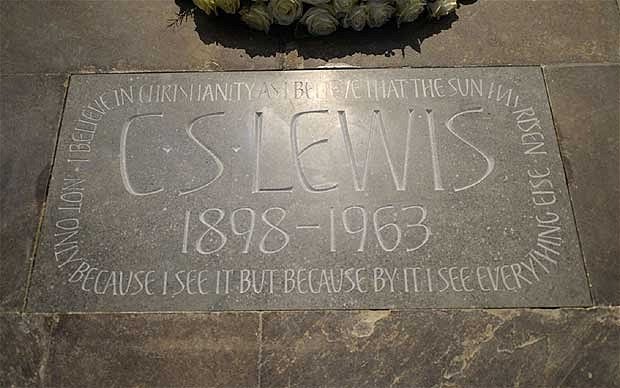I’ve been reading a lot about Clive Staples Lewis and his
take on scripture (and blogging here), while simultaneously co-directing Scientists in
Congregations, which encourages church congregations throughout the U. S. to
take science seriously. After all, November 2013 marked the fiftieth
anniversary of Lewis’s death—and on the 22nd specifically, a
memorial was dedicated in his honor in the Poet’s Corner at Westminster Abbey,
where he join William Shakespeare, Jane
Austen, T. S. Eliot, John Milton, William Wordsworth and the like. This honor for
a scholar of the Middle Ages and the Renaissance who dubbed himself a
“dinosaur” and yet whose books still sell millions of copies, whose children’s
fiction, The Chronicles of Narnia, has its fourth feature film in process, and who
was dubbed today’s “hottest theologian” just a few years ago by Time.
For all those reasons
and more, I think he’s earned the moniker of “St. Clive.”
For other reasons, I’m
pondering these thirty-seven Christian congregations we’ve funded, who represent
twenty-five different states, two other countries, eleven denominations, thousands
of members, and the gamut along the theological spectrum. They know science is fascinating,
powerful, and important, but aren’t convinced, like Richard Dawkins, that
science—and particularly Darwin—“made it possible to be an intellectually fulfilled atheist.”
They also realize, in order to engage the insights of science, they need to understand
their Bible better. Like other Christians, they have a sense—from vague to
quite poignant—that the Good Book is crucial for them.
All this brings me to wonder if these two projects could
speak to one another, especially around the Bible. Here’s why: Christians that
love science also value the Bible, and C. S. Lewis was a world-class Oxford and
Cambridge literary scholar who viewed the Bible in a way that is neither truly
liberal nor conservative and that allows for both a penetrating engagement with
scripture and with science.
Lewis knew how to read a book and prized what books bring. “There
is nothing in literature,” Lewis wrote in his famous academic study, The Allegory of Love, “which does not,
in some degree, percolate into life.” Consequently, Lewis read the Bible as a
literary text (which is certainly not the same as taking the text literally)
and sought to find God’s word carried by Scripture. He read the Good Book as
full of narratives, meaningful stories, or—as he liked to put it—“myths”… which
doesn’t always equal “fiction.” Myth, as Lewis wrote, is “at its best, a real
unfocused gleam of divine truth falling on human imagination.” And, as he concluded
after a famous 1931 walk with J. R. R. Tolkien and Hugo Dyson, myth became fact
in Jesus (which, of course, is recorded in the New Testament).
In that light, Lewis believed the Bible as a book could be
read on its own terms and offer legitimate wisdom. Therefore, it didn’t need
science to validate its claims. Paradoxically, this may be the best way for
congregations that take science seriously as they read their Bibles… in other
words, not to suffer unnecessary pains about whether the Bible supports or
denies science. Having studied the way churches interact with science over the
past two decades—and the thirty-seven congregations we’ve funded—I realize that
the Bible often seems outdated because it has not been updated with the most
current scientific discoveries. How can we correlate quantum theory and the
book of Genesis? Not a particularly pertinent question to Lewis. Science can
have a freedom not bound by its corroboration with a specific biblical text. And
the Bible, for its part, doesn’t need quantum theory to make it true.
Does Lewis help us today? Many impugn the Bible’s truth
because it doesn’t match with the advance of scientific knowledge. It seems
outdated and surpassed. In response, we must recall that Lewis never believed
that science—nor particularly what he called the “Scientific Outlook”—should be
the final arbiter of truth. So he forcefully and consistently argued—in fact,
at his vastly popular Oxford Socratic Club, among other places—against science
and its norms standing above other forms of knowledge and authorities, such as
the ongoing testimony of the church (in the case of scripture).
This means that his understanding of scripture leads to a
model of some freedom in its relationship with science and vice versa. Lewis’s
approach may at times help Christians avoid pseudo-problems with the Bible when
it does not provide, in his words, “impeccable science.” For example, Lewis
writes, Genesis 1-2 probably “derived from earlier Semitic stories which were
Pagan and mythical,” or as the church Father Jerome put it, was written “after
the manner of a popular poet” (thus a myth). And yet, under the guidance of the
Father of lights, Lewis concluded that this biblical text became a vehicle for
the profound story “which achieves the idea of true Creation and a transcendent
Creator.”
Our project has clearly discovered that the Bible and
science can and must speak to one another, but these discoveries imply no need
to justify the truth of biblical texts against modern science of Big Bang
cosmology or evolution, for example. Instead we are free to make connections
where they exist. It’s a free interchange without forced agreement or
impenetrable conflict.
In the end, Lewis liberates us to read the Bible as a
powerful book—one that leads Christians to the center of their faith, Jesus
Christ—and to let the liberated study of science also take place. I think
that’s something that will take us forward in the discussion and that can help our
Scientists in Congregations churches. Maybe that’s one more reason Lewis still
speaks today.


No comments:
Post a Comment